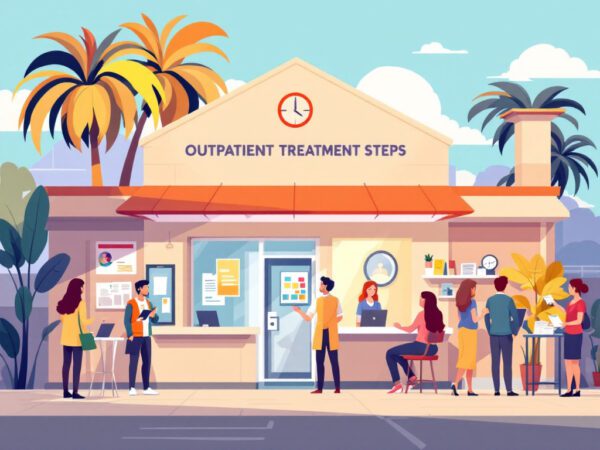Totality Treatment for Drug & Alcohol Rehab
When considering treatment options for drug and alcohol addiction, Totality Treatment offers a comprehensive approach that focuses on personalized care. We understand the journey to recovery is unique for everyone, and we strive to create an environment that supports individual needs.
Levels of Care Offered
At Totality Treatment, we provide varying levels of care tailored to the severity of addiction and individual circumstances. These levels allow for flexible treatment that can progress or adjust according to the client’s recovery journey.
| Level of Care | Description |
|---|---|
| Detoxification | Medically supervised detox to manage withdrawal symptoms. Ideal for those needing immediate relief from substance use. detox placement. |
| Outpatient Programs | Therapy sessions range from individual to group formats, typically from every other week to multiple times a week. This level is suitable for those transitioning from higher intensity treatments. outpatient addiction treatment. |
| Intensive Outpatient Program (IOP) | More frequent sessions that allow for monitoring while maintaining daily responsibilities. Perfect for individuals requiring more support without full-time residential care. intensive outpatient program. |
| Partial Hospitalization Program (PHP) | Offers a more structured environment with daily treatment for individuals requiring intensive support and stabilization. partial hospitalization program. |
Collaborating with our team will help determine the best level of care suited for the individual’s needs, ensuring a solid foundation for recovery.
Tailored Treatment Plans
We prioritize creating tailored treatment plans designed to address the unique challenges faced by individuals struggling with addiction. Each plan incorporates various therapeutic modalities, focusing on developing coping strategies and building a support network.
- Initial Assessment: We conduct a comprehensive assessment to understand the client’s specific needs and history.
- Individualized Intensive Program: Clients may participate in holistic therapies such as psychotherapy and medication management to promote recovery.
- Family Case Management: We engage family members in treatment planning to understand the dynamics at play and support the individual’s journey, emphasizing the importance of a robust support system. family case management.
- Continuous Evaluation: As recovery progresses, we re-evaluate treatment plans to adapt to new challenges or achievements in recovery.
Totality Treatment’s commitment to personalized care ensures that we are prepared to adjust plans and levels of care based on progress and changing needs. Our multidisciplinary team is dedicated to guiding individuals on the path to lasting recovery.
OCD Treatment Options
When seeking the best ocd outpatient treatment, various methods are available to effectively address obsessive-compulsive disorder (OCD). We explore psychotherapy approaches, medication management, and advanced treatment methods in this section.
Psychotherapy Approaches
Psychotherapy is a foundational element of OCD treatment. Cognitive Behavioral Therapy (CBT) is particularly recognized for its efficacy. It incorporates a specific technique known as Exposure and Response Prevention (ERP). ERP exposes individuals to feared objects or situations over time and teaches them not to engage in compulsive rituals, leading to a substantial decrease in fear (Mayo Clinic).
| Therapy Type | Description | Effectiveness |
|---|---|---|
| Cognitive Behavioral Therapy (CBT) | Focuses on changing negative thought patterns and behaviors. | Highly effective |
| Exposure and Response Prevention (ERP) | Teaches clients to confront feared situations and refrain from compulsive behaviors. | First-line treatment |
Combining ERP with other therapeutic modalities can further enhance treatment effectiveness, especially for individuals with complex or comorbid conditions.
Medication Management
Medications can play a crucial role in the management of OCD. Selective Serotonin Reuptake Inhibitors (SSRIs) are often the first-choice medications due to their evidence-based success in treating OCD. Clomipramine, a tricyclic antidepressant, is another viable option, particularly for those who do not respond adequately to SSRIs or experience intolerable side effects (IOCDF).
| Medication Type | Examples | Notes |
|---|---|---|
| Selective Serotonin Reuptake Inhibitors (SSRIs) | Fluoxetine, Sertraline | First-line treatment |
| Tricyclic Antidepressant | Clomipramine | Effective for treatment-resistant cases |
Combining medication with therapeutic approaches generally yields the best results for long-term management.
Advanced Treatment Methods
Beyond standard medication and therapy, advanced treatment options are emerging in the field of OCD care. Examples include Transcranial Magnetic Stimulation (TMS) and Eye Movement Desensitization and Reprocessing (EMDR) therapy. While TMS offers a non-invasive way to stimulate brain regions associated with mood and anxiety, EMDR is used primarily in trauma-focused therapy.
| Treatment Method | Description | Application |
|---|---|---|
| Transcranial Magnetic Stimulation (TMS) | Uses magnetic fields to stimulate nerve cells in the brain associated with mood regulation. | For treatment-resistant patients |
| Eye Movement Desensitization and Reprocessing (EMDR) | Integrates elements of cognitive-behavioral therapy with eye movements to help process traumatic memories. | Particularly effective for trauma-related OCD symptoms |
Our goal is to ensure that everyone has access to comprehensive and tailored approaches for managing OCD effectively. For more details on advanced treatment options, please refer to our articles on intensive outpatient programs and medication management outpatient.
Lifestyle and Home Remedies for OCD
In managing obsessive-compulsive disorder (OCD), professional treatment is essential, but there are also effective lifestyle and home remedies that can complement our treatment plans. These approaches can enhance the overall management of OCD, providing additional support and coping strategies.
Complementary Strategies
Incorporating lifestyle changes and strategies into daily routines can significantly aid in managing OCD symptoms. Here are several complementary methods:
- Mindfulness and Meditation: Practicing mindfulness can help individuals become more aware of their thoughts and reduce anxiety associated with obsessive thoughts.
- Regular Exercise: Engaging in physical activity can lead to improved mood and anxiety reduction. Studies indicate that even moderate exercise can benefit mental well-being.
- Healthy Nutrition: Maintaining a balanced diet is crucial. Certain nutrients, particularly omega-3 fatty acids, may play a role in brain health and mood regulation.
- Sleep Hygiene: Ensuring sufficient and quality sleep is essential for mental health. Developing sleep rituals can enhance sleep quality, thereby reducing anxiety levels during the day.
- Journaling: Writing about one’s thoughts and feelings can help process emotions and reduce the intensity of obsessive thoughts.
We encourage discussions with mental health professionals to identify which strategies may be best suited for specific needs. For more information on various treatment options, please refer to our section on outpatient addiction treatment.
Support Systems
Having a robust support system is vital for effectively managing OCD. Establishing connections with others who understand the challenges of OCD can provide encouragement and advice. Here are some support systems to consider:
- Therapy Groups: Group therapy specifically for OCD can facilitate sharing experiences and learning from others who have similar challenges.
- Family Support: Education for family members about OCD can foster a better understanding and create a supportive home environment.
- Online Communities: Connecting with others through online forums or social media groups can offer additional emotional support and resources.
- Close Friends: Having a trusted friend or family member to talk to about experiences can be immensely helpful in coping with the highs and lows of OCD.
Integrating these support systems into daily life offers emotional resilience and strength when managing OCD. For those looking to explore additional therapeutic methods, including integrated programs, please check our links on intensive outpatient program and other related resources. We must approach OCD treatment from multiple angles to foster a holistic recovery journey.
Optimizing OCD Treatment
To ensure effective management of obsessive-compulsive disorder (OCD), it is crucial to focus on a collaborative diagnosis and consider long-term treatment strategies. This approach helps in tailoring effective interventions that cater to individual needs.
Collaborative Diagnosis
Collaborative diagnosis involves working closely with treatment providers to identify the most effective treatment plan for an individual’s symptoms and needs. Given the varying intensity and nature of OCD, this collaborative effort helps to determine the appropriate level of care required. Different levels of care can offer various treatment intensities, frequencies, and durations, which depend on how significantly OCD affects daily functioning (Pennsylvania Psychological Association).
By engaging in open discussions with mental health professionals, we can assess the severity of OCD, allowing for the adjustment of treatment types such as psychotherapy, medication management, or a combination of both, which is often considered the gold standard for managing OCD (IOCDF). This ongoing dialogue ensures that as progress is made, treatment plans can be adapted to maximize effectiveness.
Long-term Treatment Considerations
Long-term considerations in OCD treatment focus on maintaining symptom control rather than achieving a complete cure. OCD treatment is often a long-term commitment, requiring ongoing support and possibly more intensive interventions if symptoms worsen (Mayo Clinic).
The two primary treatment methods for OCD are psychotherapy, particularly cognitive-behavioral therapy (CBT), and medication, such as antidepressants. Combining these approaches usually yields the best results, allowing for a more comprehensive treatment experience. Depending on the severity of the disorder, some individuals may find they need long-term therapy or ongoing support even after significant progress (Mayo Clinic).
It’s vital for individuals and their support systems to recognize that insights about their condition can significantly influence their treatment trajectory. Research indicates that those with better insight into their OCD and shorter durations of illness tend to achieve better outcomes (PubMed Central). Hence, embedding strategies within treatment that support insight and understanding about OCD can be beneficial for long-term management.
In our journey to optimize OCD outpatient treatment, collaborating on diagnosis and committing to long-term strategies are paramount. We encourage exploring various outpatient treatment options to find the best fit for ongoing support and symptom management.
Outpatient Treatment Programs
Outpatient treatment for OCD provides individuals with access to various therapeutic options while allowing them to maintain their daily routines. We believe this flexibility is crucial for effective recovery.
Types of Outpatient Programs
There are several types of outpatient programs available, each designed to meet different needs:
| Program Type | Description |
|---|---|
| Traditional Outpatient Program | Typically involves individual, family, or group therapy sessions ranging from every other week to twice weekly. Compass Health Center |
| Intensive Outpatient Program (IOP) | Provides multi-disciplinary and group-based treatment, usually 3-5 days per week for 3 hours each session. Compass Health Center |
| Partial Hospitalization Program (PHP) | Functions as a step-down from inpatient care, offering structured routines, including group sessions, individual therapy, and medication monitoring, attended 5 days a week for 5-6 hours per day. Compass Health Center |
Each of these programs serves specific needs, ensuring that individuals have tailored access to care based on the severity of their condition.
Frequency of Therapy Sessions
The frequency of therapy sessions in outpatient programs can vary based on the program type and individual requirements. Below is a breakdown of typical session frequencies:
| Program Type | Session Frequency |
|---|---|
| Traditional Outpatient Program | Every other week to twice weekly |
| Intensive Outpatient Program (IOP) | 3-5 days per week |
| Partial Hospitalization Program (PHP) | 5 days per week |
Understanding this frequency helps us plan our treatment schedules effectively. We take into account each individual’s needs, ensuring that the chosen program aligns with their recovery goals. If you are looking for more information on outpatient treatment, visit our page on outpatient addiction treatment.
Intensive Inpatient Care
Intensive inpatient care is designed for individuals who require a structured and supportive environment to address severe and resistant obsessive-compulsive disorder (OCD) symptoms. This approach offers a comprehensive treatment plan that includes therapy, medication, and continuous support.
Structured Inpatient Programs
At our facility, we provide structured inpatient programs that focus on personalized care for each patient. These programs generally involve 4 to 5 therapist-assisted cognitive-behavioral therapy (CBT) sessions per week, combined with medication management. By focusing on exposure and response prevention, patients can learn effective strategies for managing their symptoms in a safe environment.
Our program design allows for:
| Element | Description |
|---|---|
| Session Frequency | 4 to 5 therapy sessions per week |
| Therapy Type | Therapist-assisted CBT, focusing on exposure and response prevention |
| Medication Management | Standard pharmacotherapy for mood stabilization and symptom management |
Research indicates that this level of care is especially beneficial for individuals with OCD who have not fully responded to outpatient treatment. In a study involving 420 patients treated between January 2012 and December 2017, significant improvements were noted, with 50% showing a decline in symptoms as measured by the Yale-Brown Obsessive Compulsive Scale (YBOCS) scores (PubMed Central).
Long-term Outcomes and Response
The long-term outcomes of intensive inpatient care reflect the effectiveness of structured programs in helping individuals manage their OCD symptoms. Among the patients analyzed, different classes emerged based on response to treatment:
| Patient Response | Percentage |
|---|---|
| Remitters | 14.5% |
| Responders | 36.5% |
| Minimal Responders | 34.7% |
| Nonresponders | 14.6% |
Factors influencing these outcomes include the duration of the illness, level of insight into symptoms, and the presence of specific symptoms such as contamination concerns. Shorter illness duration and higher insight tend to correlate with better outcomes in both short- and long-term follow-ups.
With increased exposure practice and a focus on comprehensive care, our inpatient programs aim to provide lasting relief from OCD symptoms. For those seeking additional support, follow-up treatment options are available through outpatient addiction treatment and intensive outpatient programs.















